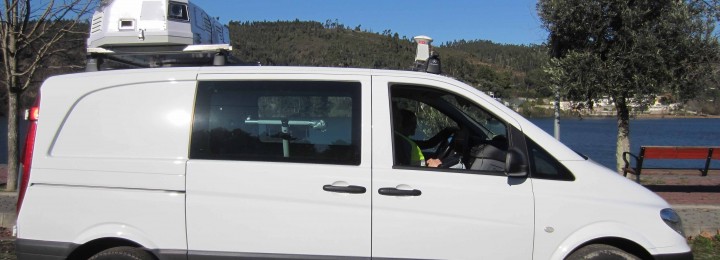10/07/2013
Misturas leads a R&D project which improves safety on roads and reduces maintenance costs

A prototype similar but technically more complex to the one used by Google for its “street view” tool collects all kind of data on the condition of roads. Orense (05-12-12). – Misturas participates in an ambitious R&D project which will enable the creation and adaptation of modern technological systems to improve safety on roads and to reduce maintenance costs. All in all, the initiative, with the participation of many other companies from Galicia and the Universidad de Vigo, and which is co-financed with European funds, develops software and technology for the inspection of infrastructures to the sole purpose of optimizing decision-taking on the need to execute or not refurbishing works on bridges, tunnels, pavements, viaducts and embankments. Basically, the researchers are creating a prototype similar to the one used by the Google car to take all the images which are introduced to its “street view” tool in maps, but with new, specific technological applications, and centimetre accuracy. In this way, a car or van where all the machinery is installed will travel the roads collecting on-the-spot necessary data to establish a diagnosis on the condition of the road. This prototype has different sensors such as a scanning laser, which enables the mass taking of data and the creation of images from clouds of points, infrared thermography, photogrammetry, video, georadar, laser perthometry and the global localization system. All the data collected are then sent to a geo-referenced base with a central computer thanks to the design of control software which synchronizes all the systems and enables a diagnosis of the actual situation of each infrastructure. This system facilitates the carrying out of studies on the signalling of roadways and the actual condition of roads entries and exits. One of the main advantages of this project is the big saving in costs and time as far as roadway maintenance works is concerned. In a data-taking day, the car can register information for more than 200 kilometres, something which will otherwise require several days of work on the site and equipment for different fields at present. The system also enables the checking on the condition of the roads to take place with a greater frequency and thus to establish priorities as regards the preservation actions to be introduced, first taking into account the actual economic scenario, where less resources does not imply disregarding matters which are road-safety related. This work, named “Proyecto Sitegi”, was co-financed by the Feder, Fondo Europeo de Desarrollo Regional, within the Programa Operativo Fondo Tecnológico 2007-2013, and by the CDTI, Centro para el Desarrollo Tecnológico Industrial. The following companies from Galicia participate in this joint research with Misturas: Extraco, Insitu Ingeniería, Enmacosa and Lógica, as well as the Grupo de Investigación TF1 of the University of Vigo. The project, in the middle of the three years foreseen for its execution, has a €3.7 million budget. The Sitegi Project has nearly a tenth of specific objectives:
- To design and manufacture an integrated system for inspection of infrastructure, a basic prototype of a mobile unit where all the necessary devices will be integrated for the mass taking of data.
- To develop protocols for inventorying road infrastructure.
- To define the methods for documentation of roadways and its associated infrastructures by means of non-destructive sensors integrated to the machinery of the car.
- To develop methods for assessment towards a diagnosis on the condition of a certain road.
- To identify maintenance requirements for appropriate preservation of roadways.
- To foster cooperation and knowledge sharing between companies from the research centres to the production sector.
- To reduce the economical cost which the maintenance of infrastructure in the Spanish territory represents and to increase safety on them.
- To foster the use of technologies which will help the participating companies to be more competitive at a global level and which shall favour their internationalization.
